Racing Across the Atlantic (Two’s Company – or is it?)
For the past twenty years now we’ve been on our way south to Patagonia. Well we’re still on our way – make no mistake about that – but we’ve slotted in another little detour. (Yes, another one…)
Heading south we will commit ourselves to a journey into the Pacific – a journey lasting thousands of miles and several years. We’re more than ready for the adventure, but at the same time we felt that there was one other thing we ought to do first. It seemed to us that, since Caesar and Xoë were born there, and since we tore them away at so young an age, it was high time we took the kids to visit the sunny Caribbean Sea. Thus it is that the dream has once again been put on hold… and thus it was that on February 8th we left the Cape Verdes and set off across the pond.
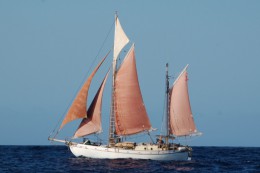
Throughout our stay in the Cape Verde islands we’ve been cruising in company with two other yachts, one of them the lovely Iolair, captained and crewed by a couple of lovely drunks, and the other Paul Johnson’s Cherub, captained and crewed by the man himself. Johnson is a legendary figure in cruising circles. He made his first crossing in 1965, aboard a 19ft clinker dinghy which he decked over, and he’s been circling the oceans ever since. Indeed, he can probably claim to be the longest-cruising sailor in the world.
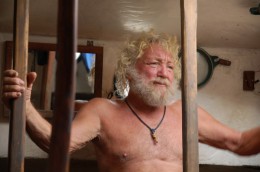
Johnson has spent the past few decades in the North Atlantic, perambulating between his three “homes”, as he calls them. The Azores is the place he loves so much that he decided to buy a plot of land and settle there in his old age – but when old age arrived he made the place over to his oldest son. Bermuda is the place where he built most of his boats, and the one where he lived for a few years – until the sea called him back. Carriacou, in the Caribbean, is the one with the best bars and the best rum – the one where his mates all hang out, and the one where his youngest son was born. Rum is one of the staples of Johnson’s diet; the main staple, indeed.
When we first met him, Johnson wasn’t sure whither he was wandering, but when he heard of our plans he decided to tag along and return “home” to those sun-soaked watering holes and rum-soaked mates. At 71 years of age he is no longer quite so sprightly as he was on his first crossing, and so he really didn’t want to make this latest one all alone. No problem. With four very able seaman and one more coming along very nicely Mollymawk can always lend a hand. And in this case we lent Xoë.
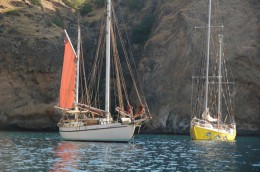
Iolair and her drunken sailors eventually tore themselves away from our company and set sail for Brazil. Perhaps we’ll catch up with them again in a few months time. Meanwhile, Johnson’s 13 year old son Merlin flew out to join ship from his home in America, and Cherub and Mollymawk were scrubbed and tidied and put in order, ready for Part Two of The Great Race.
And they’re off!
On the evening of February 8th we hoisted our sails and bowled out of the bay together – two pretty ketches kicking up their heels and flying away across the white flecked sea.
“We’ll turn the radio on at midday each day,” said Johnson. “Channel 67. Might as well keep in sight of each other too.” And, so saying, he vanished into the harmattan and into the dusk.
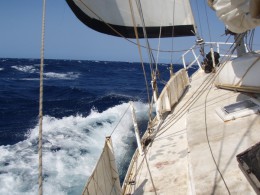
We had hardly cleared the point when Mollymawk‘s aged genoa went vrrrrrrrripppp and tore in half along a seam. It was blowing a good force seven in the acceleration zone just off the island, and in that sort of wind you simply can’t afford to let your sails flap; not for a moment. Certainly not when they’re ten years old.
But once the sail had split in two there was no way to stop it from flogging, and by the time we had it furled around the forestay it had completely shredded itself. This was not a very auspicious start to an 1,800 passage – and not the way to win a race. We quickly hoisted the stays’l and a small jib. So long as the wind continued to blow hard these were adequate for the job; but within a couple of hours the blustering breeze had fizzled away to a force three and we were sorely in need of more canvas. Thus we were not surprised, when the sun rose the next day, to find ourselves all alone on the big blue sea.
Sailing in company has never really been our kind of thing, and so we were rather relived to find that we were not, after all, going to have to sail all the way holding hands. But on the other hand it was annoying to think that Johnson had slipped through our fingers while we wallowed.
“Cherub must be miles ahead,” we told each other gloomily.
There are few things more frustrating than trying to sail a boat which is under-canvassed, and trying to race in a boat which is under-canvassed is even more maddening.
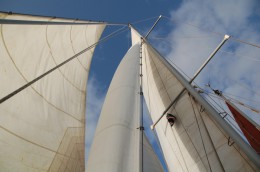
Crossing the Atlantic along the “milk-run” route in February one can expect a fast passage in steady winds. This, after all, is one of the best months in which to be making the journey. Cross before Christmas, and the tradewinds have generally not settled in; cross after May and you might find a tropical depression or even a hurricane breathing down your neck. This year, however, the wind has not been playing the game. Folks who set off in November had a sleigh ride crossing – the ARC reported their strongest winds and some of their best times – and we, who had chosen to wait till the time was right, found ourselves limping along in a force two to three.
No matter. Just so long as Cherub was also facing the same light airs we didn’t mind. A slow passage means more time out there, enjoying the sunshine and solitude in a world which is ours and ours alone. It was funny to think that Xoë and Johnson were just over the horizon. They might have been a thousand miles away.
“But they really might! Well… they might easily be a hundred miles ahead of us; we’re going so slowly with these tiny sails.”
“I hope he doesn’t run out of rum. He might, you know, if the wind stays light. And then what will he do?”
Don’t you get bored?
This is the question we are asked most often by folks who have never made an ocean passage. The answer is no, not ever; there’s always something to do. Usually the crew are busy sailing the boat. On this occasion things were a little different, however. With light winds, for the most part, and with four of us to keep watch the passage from one side of the Atlantic to the other was undemanding and unremarkable.
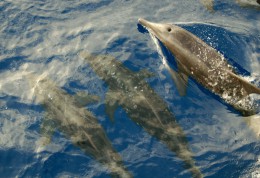
On the second day out we received a visit from a mixed school of rough-toothed dolphins and pygmy false killer whales.
On the third, forth, fifth, and sixth days nothing of any great note happened at all – but the boat kept on plodding along, and we got on with our lives, each of us doing our own thing, much as we do in harbour, but with the added factor of taking it in turns to keep watch.
On the seventh day we spotted a number of dorado swimming past the boat. Well, we can’t have that sort of thing going on, and so the kids switched to battle stations. Rox jigged the trolling lines energetically. Caesar got out his rod and actually managed to hook one of the fish, but as the line was only rated at 15lbs and Madame Dorada looked as if she probably weighed in at three times that amount it was only going to be a matter of time before he lost her.
Patiently, carefully, Caesar played that fish for almost an hour, winding her in when he could, and always keeping some tension on the line, but never letting her tug. That beautiful fish jumped and dived and swam right up to the boat – if we’d had our wits about us we could have gaffed her, she was so near – but then, finally, she jumped once too often and too suddenly, the hook fell out of her mouth and she was gone.
To be honest, I wasn’t too sorry to see her win the competition.
We did eventually catch another dorado, and during the passage we also caught several snake fish and one rather nice tuna.
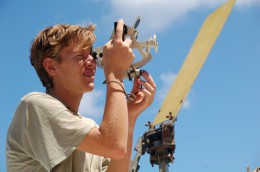
Caesar spent most of the time at sea polishing up on his skills with the sextant, and Roxanne was initiated into the black art of the Meridian Passage, or Mer Alt. The Admiral, not to be outdone, took a couple of sights and, dusting off an area of brain not much used in the life of an artist, forced herself to get to grips with Zn, Hc, declination and all that jazz – but for the most part she preferred to amuse herself with a sketch-pad and a charcoal stick, drawing the waves.
The skipper spent his time getting the boat ready for sea. Yes. By the time we had been out for a fortnight the aft deck was as tidy as it has been in years, and the engine-room was so tidy that parts of the work-bench were actually visible.
Another favourite pastime of mine on a long passgae is reacquainting myself with the patterns stamped on the night sky. We can all find Orion, with his belt and his sword, and we can find his hunting dog, with its bright eye; we can all find the plough, and Cassiopea on her w-shaped throne; but can you find Bootes and Arcturus? Can you find Canopus and Capella, Rigel, Denebola, and Zubenelgenubi?
My delight is to watch the stars rise and roll across the sky; to see them in the east and then, if I take the later watch on the next night, to see them set while others arise behind them. The Centaur pulls the Southern Cross out of the miry horizon; Ursa Minor spins around Polaris. Orion falls below the skyline ahead of us, in pursuit of the sun, while the scorpion which stung him to death crawls up above the rim of the sea astern of the boat.
By the end of the trip I could identify 29 constellations, rising at different times of the night, and 31 selected stars (which are the ones tabulated in the almanac and used for navigation). Call me a geek if you like, but I like star-spotting. It keeps me in touch with time and motion and the size and shape of the world.
We were 20 days out, and only 100 miles from our destination, before the wind finally gave us what we were owing: a healthy force four to five. Even then it was blowing from the south-east instead of the northern quarter, as it should be, but we didn’t mind that, of course; it was still bowling us westward.
Mollymawk rolled along, now and then dipping her side-decks under as the bigger waves swept beneath us; now with her boom pointing up at the clouds; now with it threatening to scrape the sea. The masts drew giddy arcs across the sky. The waves danced; the white caps tumbled. At night the moon threw down a glistening silver carpet and the little black peaks leaping past on either side of us were criss-crossed with silver scratches.
Molly was swooshing along at hull speed and surfing down the bigger slopes.
Nice. Very nice.
And then the mainsail tore in half. Again.
“It’s lucky we’re only a day away from Carriacou.”
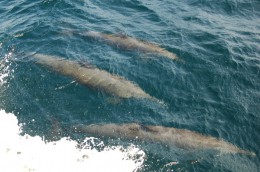
A school of spotted dolphins came out to welcome us to the Caribbean. Like torpedos, they shot effortlessly through the green glass waves. Flank to flank, six of them surfed down the waves beside us. They tacked to and fro under our bow. They jumped; they surged ahead and then doubled back.
Did they think that Molly was a whale floundering along? I don’t know; I simply cannot work it out.
That night, as the darkness took over the sky, we made our landfall on Carriacou. (Lubbers please note: a landfall is not a landing. A landfall is the first sighting of land after time spent at sea.) A few hazy lights were all that we could see at first, but when the moon rose she showed us a whole spread of islands and islets.
We were set to pass between Carriacou, together with the shower of cast-off crumbs which adorn the seas off her southern shore, and Grenada, plus the rocks and reefs which clutter that side of the channel. Had the moon not been there to aid us we would probably not have risked coming through in the darkness; and, as it was, we subsequently had to spend the rest of the night – from the witching hour until the dawn – reaching to and fro in the lee of the island. Caesar, during his watch, saw another yacht head in towards the coast, but having never been here before we daren’t approach without being able to see what we were doing.
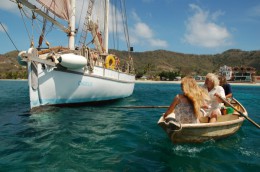
At sunrise we tacked in towards Hillsborough – and, lo and behold, who do you think we found sitting there, at anchor, right beside the dock?
Yes, it was Johnson.
“He’s probably been here for days.”
“No he hasn’t.” I said. “I’m sure he hasn’t. Look, he’s getting into the dinghy. It’s only half past eight, but he’s going ashore.”
“So?”
“Well, he looks to me like a man who’s just arrived and who’s desperate to get to the rum shop.”
And so it proved to be.
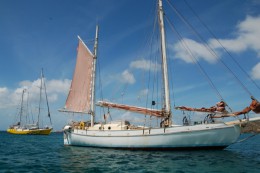
After 22 days on the broad blue Atlantic with never a sight nor a sound of one another Mollymawk and Cherub managed to sail into Hillsborough hand in hand! How about that! While we were sailing in through the southern passage, Johnson was coming in around the northern end of the island, and it was almost certainly he who Caesar saw sailing into the bay in the dark.
“So we’ll call it a draw, then.”
“Okay, but the first round is on Johnson.”

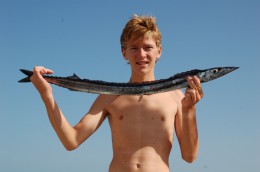
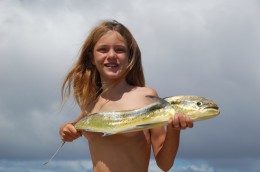
Hiiiiiiii! Nice to heard you cross the oceans again 😉
Yesterday we been chating with a couple friends form france and imagine what we found on his logbook?? A picture of a crazy family 8 years ago on a boat full of boxes and with 3 kids……….yes was all you.
The french ladys are Cristina and Jaqueline Darde from StellaMaris boat, this fantastic ladys with a super spirit are heading south to patagonia again! incredible.
We meet in Rio Grande do Sul , south of brazil and now that we know you are on this side of the ocean maybe we meet you soon than we think.
A big hog to all you family and have good winds allways.
Ezequiel and Florencia
S/V YPAKE
Hi, we met Paul in Hillsborough and joined him to pick up his engine in Bequai as he’d been missing it for 7months. He’s currently in Bequia but me my partner and two small boys lived and sauled with him for two weeks. He’s 76 now and as we entered Bequias anchorage at 8knots no engine and all sails up he got many salutes once we’d anchored deep in to the bay. He is magic! Lovely to read your story. I sailed for three years before my children and plan to get a sailing boat again with my boys before they start school. Paul inspired me. Laura x